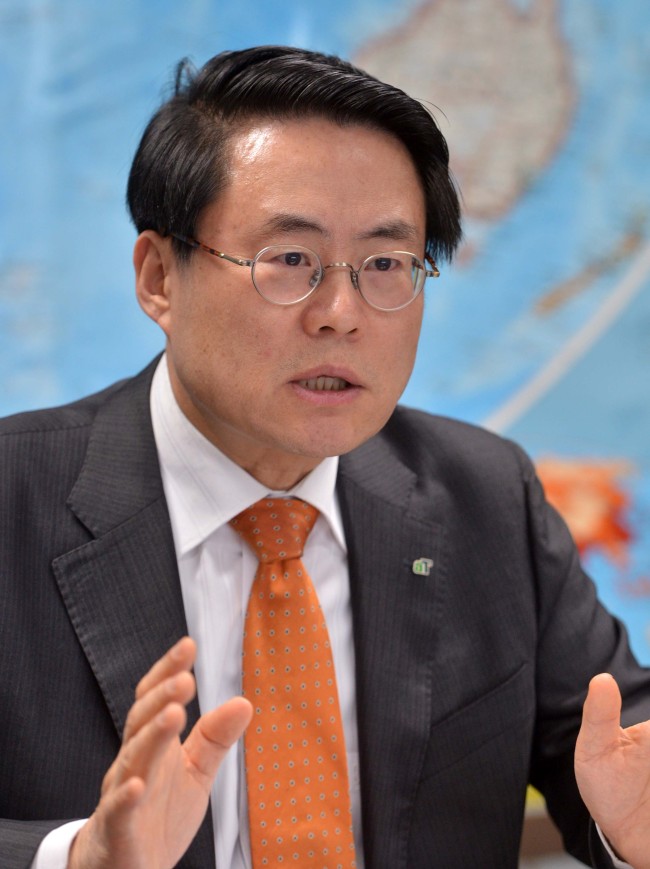“한류 바람을 타고 우리 농산물도 고급화해서 제대로 한번 팔아봅시다.”
20년여 세월을 한국 농수산 발전을 위해 한길을 걸어온 농수산식품유통공사 김재수 사장의 간절한 바램이다.
일인당 국민소득 2만불 시대의 한국이지만, 글로벌 시장에서 한국의 존재는 여전히 조금은 미미하다는 점이 안타깝다는 김 사장은 한국사람이 한국음식으로 대접받는 시대가 오기를 기원한다고 인터뷰에서 밝혔다.
싸이도 하는데, 우리 농수산도 충분히 할 수 있다는 김 사장.
그는 “우리 음식에 대한 세계적 호기심이 한국 음식의 소비를 증대시키고 있다. 게다가 우리나라 고유 음식은 헬씨 (HEALTHY), 즉 건강이라는 글로벌 키워드와도 딱 맞아떨어진다,” 며 수출 100만불 시대가 곧 도래하리라고 예상했다.
문제는 스타 상품의 부재다.
다양한 한국국적의 음식상품이 있기는 하지만, 정작 눈에 띄는 품목은 없다.
이를 극복하려면 경쟁력이 뛰어난 품목을 정해 고가의 제품으로 가공해 프리미엄 시장을 노려야 한다. 또, 한국의 맛을 잃어버리지 않으면서, 현지인의 입맛도 함께 고려한 식품을 개발해서 판매 해야 할 것이다.
김 사장은 기업의 역할에도 주목했다. 글로벌 시장 석권은 각국 대형 유통업체와의 관계 없이는 불가능하다. 그 관계를 맺어가는 주체가 바로 우리 기업이다.
(코리아 헤럴드 김지현 기자)
<관련 영문 기사>
Agricultural sector urged to go high-end
By Kim Ji-hyun
Riding the Korean Wave is not enough. For local farm products to cater to a bigger international audience, they must find ways to become premium, high-end brands, according to a man who has devoted his life to developing Korea’s agricultural sector.
“If Psy can do it, why not our cuisine?” asks Kim Jae-soo, president of the state-run Korea Agro-Fisheries & Food Trade Corp., or aT, in an interview with The Korea Herald.
“Hallyu definitely helped boost Korea’s image, but the agricultural sector must get more serious about branding and packaging, and also strive to give global consumers the assurance that farm products from Korea are only the safest and the best.”
There is a litany of popular homegrown agricultural products, including some that have recently gained huge popularity, such as dried and salted seaweed, but there’s no real “star player,” according to Kim.
“We need key products of the utmost quality that everyone can identify with Korea,” he said.
And the foundation has already been built, since Korean cuisine -- best known for fermented foods or vegetables -- has earned quite a reputation for being one of the world’s healthiest diets. “We are in sync with the global food trend, which is to go healthy,” Kim noted.
Color is another factor Kim believes is giving Korean cuisine an advantage, as the bold yellow, black, red, green and white that are used tastefully in most traditional Korean dishes stimulate the interest of global consumers who are increasingly becoming enthralled with Asian food.
Reflecting their changing appetites, some of the world’s top culinary schools have ties with Korea.
The Culinary Institute of America, a top private academy affiliated with France’s Le Cordon Bleu, for instance, has been developing dishes using dried seaweed in a joint effort with the Agro-Fisheries Corporation.
But the government cannot do it alone, Kim stressed, saying it’s up to the companies to reinforce their footing in the overseas markets with aggressive and effective marketing.
“Once we get things running, the private sector must work on carving out a bigger slice of the market by working on marketing and constantly communicating with the markets they are in to study the local food trends and cater to the local community,” Kim advised.
Kim believes the day agricultural exports hit $10 billion, a psychological threshold for the sector, will come in the near future.
As of last year, exports reached slightly over $8 billion, an admirable feat, the CEO said, considering the global economic recession.
Japan, China, Vietnam, Thailand, Hong Kong, Russia, Taiwan and the UAE are only some of the countries that Korean agricultural products are shipped off to.
The government’s Free Trade Agreements are being reflected in the export destinations, Kim noted, who said the corporation has seen increased shipments to the U.S., EU and the ASEAN.
Japan, meanwhile, is the steady No. 1 export destination, riding on the unwavering demand in the neighboring country’s demand for Korean-grown dried seaweed, tuna and paprika.
Kim has helped shape the government’s agricultural and food policies for two decades and was the recipient of the French National Order of Merit for his role in mediating between the two nations’ agricultural policies.
It’s now his wish to see Korea identified not only by its time-old culture and diligent people, but the food and cuisine.
“Despite that Korea is now a country with a GDP per capita of over $20,000, it has no real culinary recognition in the world, which is a shame. I think it’s time we developed and exported foods and dishes that will put Korean on the global map, once and for all,” Kim said.
(
jemmie@heraldcorp.com)








